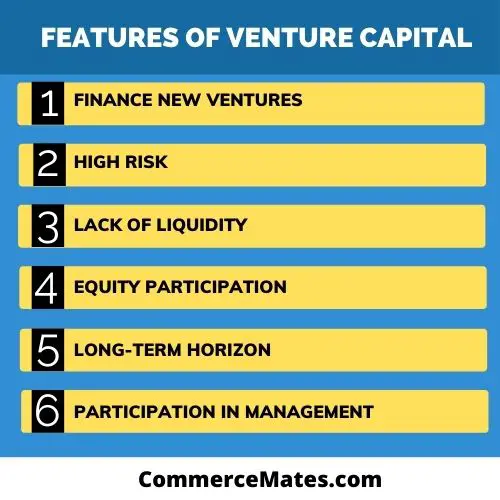Contents
Meaning of Venture Capital
Venture Capital is type of private equity financing provided by investors to start-up companies having a high growth potential. The investors who invest their money into these emerging businesses are termed as venture capitalists. Venture capitalists generally includes well-off investors, investment banks and other financial institutions. These investors seek higher returns possibility by doing investors in businesses having exceptional growth potential. However, these types of investments are quite risky as they are of illiquid nature and their return is totally dependent upon the company growth. They may provide better returns to investors if a right venture is chosen by them for doing an investment. Venture capital may not always be provided in the form of monetary, but also includes any managerial or technical expertise provided to companies. It is an efficient source of capital available to a company that brings in both wealth and expertise without having any obligation on business to repay the money.
Features of Venture Capital
Finance new ventures
Venture capital is a convenient source of raising finance for startup and early-stage businesses. New ventures face difficulty in raising capital from capital market in their early stages of operations. Firms with innovative projects and higher growth potential are easily able to attract investors who are willing to do investments for the sake of earning higher returns.
High risk
These types of investments are very risky in nature. Venture capital investments involve putting funds by individuals into new ventures who are in their early stage and carry lot of uncertainty of succeeding in their objectives. The return of investments is totally dependent upon the growth rate of companies. Therefore, it all depends upon selecting the right type of venture by investors for earning the expected returns.

Lack of liquidity
Venture capital investments are illiquid in nature. These types of investment cannot be encash by investors in short term. Venture capital investments are long term investments which can be either in the form of loan or convertible securities. In addition to this, the benefits from such investments may be realized in long run as their return completely depends upon the growth of company.
Equity Participation
It involves financing of ventures through equity participation. Venture capitalist make investments in startups by buying their equity capital. These investors aim at making a large amount of capital gain by selling all the shares held by them once they become profitable.
Long-term horizon
These investments are meant for long term which support companies in expansion and growth during their early stages of business. It is done via buying equity capital which offers returns in long run. It is not an favorable investment avenue for individuals looking for benefitting in short period of time.
Participation in management
Venture capitalists by doing investment in equity capital of a company take part in management of the business. They do not merely provide finance to startup companies, but also provide management expertise by taking active interest in business of borrowing concern. Venture capital approach is distinct from the ordinary stock market or a traditional lender of banker that merely provide capital without participating in company’s management.